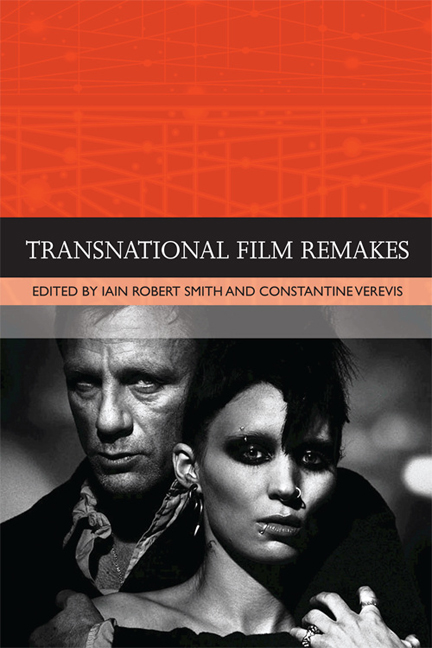Book contents
- Frontmatter
- Contents
- List of Illustrations
- Traditions in World Cinema
- Introduction: Transnational Film Remakes
- PART I GENRES AND TRADITIONS
- 1 Disrupting the Remake: The Girl with the Dragon Tattoo
- 2 Fritz Lang Remakes Jean Renoir for Hollywood: Film Noir in Three National Voices
- 3 The Cultural Politics of Remaking Spanish Horror Films in the Twenty-first Century: Quarantine and Come Out and Play
- 4 ‘For the Dead Travel Fast’: The Transnational Afterlives of Dracula
- PART II GENDER AND PERFORMANCE
- PART III AUTEURS AND CRITICS
- Notes on the Contributors
- Index
1 - Disrupting the Remake: The Girl with the Dragon Tattoo
from PART I - GENRES AND TRADITIONS
Published online by Cambridge University Press: 22 December 2017
- Frontmatter
- Contents
- List of Illustrations
- Traditions in World Cinema
- Introduction: Transnational Film Remakes
- PART I GENRES AND TRADITIONS
- 1 Disrupting the Remake: The Girl with the Dragon Tattoo
- 2 Fritz Lang Remakes Jean Renoir for Hollywood: Film Noir in Three National Voices
- 3 The Cultural Politics of Remaking Spanish Horror Films in the Twenty-first Century: Quarantine and Come Out and Play
- 4 ‘For the Dead Travel Fast’: The Transnational Afterlives of Dracula
- PART II GENDER AND PERFORMANCE
- PART III AUTEURS AND CRITICS
- Notes on the Contributors
- Index
Summary
A key feature of the cultural landscape of the twenty-first century has been the global success of so-called ‘Nordic Noir’. Indeed, it was this very global success which led both to the ‘foreignising’ remake which this chapter will discuss and to the controversy it provoked. In the words of the website which is devoted to and named after the genre and which organises London's annual ‘Nordicana’ festival, ‘With its roots in the ground-breaking TV dramas The Killing, Borgen, Wallander and The Bridge, Nordic Noir has become a genre in its own right, influencing screenwriters far beyond the Scandinavian Peninsula’ (Nordic Noir and Beyond n.d.). While to non-Scandinavian eyes this wealth of successful crime fiction might seem like a new phenomenon, this is far from true. As Kerstin Bergman illustrates in her overview of Swedish crime fiction (2014), the Scandinavian countries, in particular Sweden, have a long and fascinating tradition of crime literature. Crime novels have attracted large domestic readerships since the early twentieth century. However, it was the growing awareness of social injustice and political corruption in Sweden of the 1960s and the increasing politicisation of intellectual and public spheres which arguably led to a form of crime fiction (Bergman 2014: 21), the police procedural featuring a critique of wider social issues, which would dominate for years to come, notably in the form of the so-called ‘Nordic Noir’. At the forefront of this sub-genre were the husband and wife writing pair, Maj Sjowall and Per Wahloo. From 1965 to 1975 Sjowall and Wahloo published a series of novels, beginning with Roseanna (1965) and ending with Terroristerna (1975), all featuring Inspector Martin Beck. Set in contemporary Stockholm, the novels feature both physical and psychological realism embodied in the thoughtful but flawed central figure of Beck. As Bergman points out, what really made these novels stand out from their predecessors, and what made them so influential in terms of the ongoing development of the genre, was their ‘conscious inclusion of a critical perspective on Swedish society’, their politicisation of the police procedural genre (22).
Despite this long and extremely rich history, it was not until Stieg Larsson's Millennium trilogy that Scandinavian, or more precisely Swedish, crime fiction achieved true global prominence.
- Type
- Chapter
- Information
- Transnational Film Remakes , pp. 21 - 35Publisher: Edinburgh University PressPrint publication year: 2017



